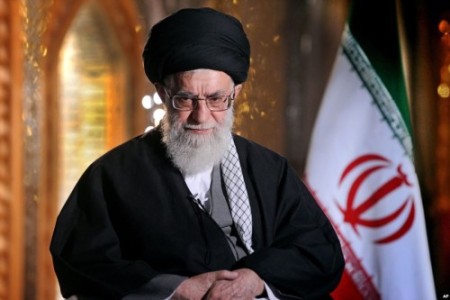As Iranians celebrate Nowruz, the Supreme Leader marked the beginning of the Persian New Year by delivering the latest salvo in the assault on the Rouhani administration’s efforts to open up cultural space in Iran.
At the shrine of Shia’s 8th Imam, Reza, in the northeastern city of Mashhad, the Supreme Leader declared that the question of “culture is even more important than [the] economy”, indicating the significance of the tension between the Government and hardliners on this issue.
However, it was his next statement that may provoke the most attention: Ayatollah Khamenei used the example of the Holocaust to justify the imposition of constraints on cultural freedom inside Iran.
In a display of supremely twisted logic, Khamenei put forward the thesis that no country in the world has absolute freedom. As proof, he cited the “censorship” of those who would deny or question the Holocaust as proof that Western nations also impose constraints on speech and writing. So, according to Khamenei, the Islamic Republic is within its rights to maintain its “redlines” when it comes to cultural matters.
It takes a special kind of ignorance, insensitivity and spitefulness to co-opt one of the greatest crimes and tragedies of the twentieth-century for one’s own political agenda — especially when that agenda is to oversee the continued control of culture and the suppression of freedom of expression.
Since the Presidency of Mahmoud Ahmadinejad — the half-comic, half-sinister bogeyman of Western governments — ended with a whimper last year, there have been fewer cases of Iranian government officials nonchalantly and callously referencing the Holocaust. To the contrary, one of the signs of the Rouhani Government’s move toward “openness” was the recognition of the crime by Foreign Minister Mohammad Javad Zarif last autumn.
The Supreme Leader has undone any advance. Western media, alongside those who argue that the current government in Tehran is no different from its predecessor, will report this latest pronouncement with gusto.
So why make such a statement now, given that Western countries and Iran are in the midst of negotiations that could lead to a comprehensive nuclear deal?
Beyond its reference to the Holocaust, the Supreme Leader’s speech is an intervention the ongoing conflict between the Rouhani administration — in particular the President and the Islamic Guidance and Culture Ministry — and hardline political elements within the regime. Leading the charge against the government is the Islamic Revolutionary Guards Corps, which has resisted the government’s policies on cultural issues since Rouhani’s election.
The battle between the “moderate” Rouhani government and its “hardline” opponents had been temporarily put to one side by the Supreme Leader: to protect the president’s nuclear policy, Ayatollah Khamenei warned Rouhani against efforts to open up the domestic sphere on questions of culture.
The tension did not disappear, however. Political tempers simmered and then boiled over as hardliners renewed criticism of Government officials.
The Supreme Leader’s latest proclamation moves him from referee to partiicipant. It is a firm signal that, while he might stand behind Rouhani’s nuclear negotiations, he is backing the hardline position on cultural questions.
But again, why now?
It is not unusual for Iranian politicians to use the New Year celebrations to send defiant messages to the West. But there was another equally important dimension to Khamenei’s statement today — the clue to “a message within@ was in his exaltation of the scale of demonstrations to mark the anniversary of the Revolution on 22 Bahman (February 11).
They've openly said that they'd tighten #sanctions 2instigate ppl 2take 2streets against the govt. What was outcome?huge turnout on22Bahman.
— Khamenei.ir (@khamenei_ir) March 21, 2014
This was not just exaltation. It was a sign of nerves:
Almost five years after the mass protests following the disputed 2009 Presidential election — protests framed as “sedition” by the hard-line culture warriors — the Supreme Leader still feels compelled to claim large turnouts on big days in the Islamic Republic’s history. These turnouts, he insists, show that the Iranian people reject foreign entreaties and manipulations to turn against their regime.
At some points, that insistence passes assurance and approaches shaky insistence. All is well, no dissent here, all in Iran march for the system and the Supreme Leader.
But what if all is not well? What if the frustrations and hopes of Iranians who marched in 2009 have not disappeared? What if anger and disillusionment has been fed by economic problems — problems that the Supreme Leader said today had not been handled effectively by the Government in its seven months in office?
Khamenei is worried about the economy. And he is far from certain that, in difficulties, he can count on the support of his people.
That is why he has come off the fence — Holocaust reference included — on the “culture war”. And that points to more, rather than less, conflict within Iran in the near-future.

